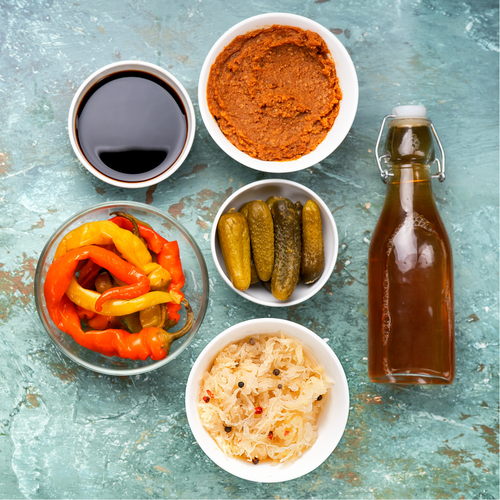In fact, in France, 1 in 3 people are affected by a sleep disorder, so much so that the French sleep on average 1.5 hours less than they did 50 years ago. Difficulty falling asleep, waking up untimely, insomnia... All these worries that seem minor at first glance can turn out to be truly disabling. Poor quality sleep leads to drops in energy during the day, a smaller volume of gray matter in adolescents, a drop in immunity to minor everyday viruses (colds, etc.) as well as an increased risk of developing more serious pathologies (diabetes, obesity, cancer, cardiovascular diseases, etc.).
Fortunately, a few lifestyle changes can often solve the problem. These small habits include nutrition, and even more so: micronutrition. To regain control over your body, you need to regain control over what you put into it! Here are some tips to help you do just that.
Compose your plate in accordance with your sleep-wake hormonal cycle
It sounds scary when you say it like that. Yet it's actually quite simple. There are a few neurotransmitters, or hormones, that govern the sleep-wake cycle.
Among other things, dopamine is a hormone that promotes alertness, motivation, productivity, and concentration. We'll therefore rely on it to start the day: to encourage its production in the body, we increase our consumption of foods rich in tyrosine, its precursor. It is found in milk, eggs, meat, nuts, almonds, avocado, rye, etc. This allows us to have energy throughout the day.
From late afternoon, from snack time to dinner, it is best to promote the production of serotonin, a hormone that rhymes with relaxation and rest, but which above all generates the production of melatonin: the sleep hormone! This point is therefore very important. To produce serotonin, then melatonin, the ideal is tryptophan, the precursor of serotonin. As a snack, you can therefore eat a banana, oilseeds, dark chocolate... These are all products rich in tryptophan! For dinner, favor poultry, fish, eggs, brown rice, legumes, dairy products... And don't forget to combine it with a good dose of carbohydrates, because they promote the absorption of tryptophan.
Come on, we'll give you our ultimate secret: chia seeds are among the foods richest in tryptophan, in addition to containing a thousand benefits. As a topping, or in pudding, we love them!
Eat a balanced diet overall
The production of these neurotransmitters is only possible in the presence of vitamins and minerals, and if the metabolism of carbohydrates, lipids, and proteins is functioning normally. We therefore pay particular attention to our diet as a whole!
Additionally, certain micronutrients also promote quality sleep. This is the case for vitamin B6, which is found in large quantities in garlic, cereals, nutritional yeast, certain fruits and vegetables, pistachios, nuts, etc. As is magnesium, which is well represented in green vegetables, whole grains, legumes, oilseeds, chocolate, etc. These two micronutrients contribute to the production of serotonin.
You can also choose your mineral water based on this factor! Micronutrients are often mentioned on the label.
Don't eat dinner too late
We don't want the digestive process to disrupt your hard-earned sleep, so ideally, we recommend eating your last meal 2 to 3 hours before bed.
Avoid stimulant drinks after 4 p.m.
Drinking coffee and tea late in the day can disrupt your sleep. This is due to the caffeine/theine they contain: this substance blocks adenosine receptors, the signal sent to the body when a lot of energy has been used and it's time to rest. Studies agree that it's best to consume your last cup at least 6 hours before bed.
Replace them with herbal teas
We no longer praise the virtues of plants. Some have anti-stress, calming, and sleep-inducing properties. So, when bedtime approaches, you can gather around an infusion of valerian, passionflower, verbena, lemon balm, chamomile, or even linden.
To be avoided!
Finally, here are some habits to avoid in order to sleep well:
- protein overdose, because it's all a question of balance: by overloading your plate with protein, you increase the production of dopamine.
- the consumption of decaffeinated drinks, as these are not entirely caffeine-free.
- fatty, spicy, or simply difficult to digest food, as difficult digestion can disturb your sleep.
Sources:
[1] Inserm. 2017. Sleep ⋅ Inserm, Science for health . Available at: https://www.inserm.fr/dossier/sommeil/
[2] Drake C., Roehrs T., Shambroom J., Roth T. Effects of caffeine on sleep taken 0, 3, or 6 hours before bedtime . J Clin Sleep Med 2013;9(11):1195-1200.
[3] American Academy of Sleep Medicine. 2013. Late afternoon and early evening caffeine can disrupt sleep at night. https://www.eurekalert.org/news-releases/716109
[4] Doherty, R., Madigan, S., Warrington, G., & Ellis, J. (2019). Sleep and Nutrition Interactions: Implications for Athletes. Nutrients , 11 (4), 822. https://doi.org/10.3390/nu11040822
[5] Kałużna-Czaplińska, J., Gątarek, P., Chirumbolo, S., Chartrand, MS, & Bjørklund, G. (2019). How important is tryptophan in human health?. Critical reviews in food science and nutrition , 59 (1), 72–88. https://doi.org/10.1080/10408398.2017.1357534














